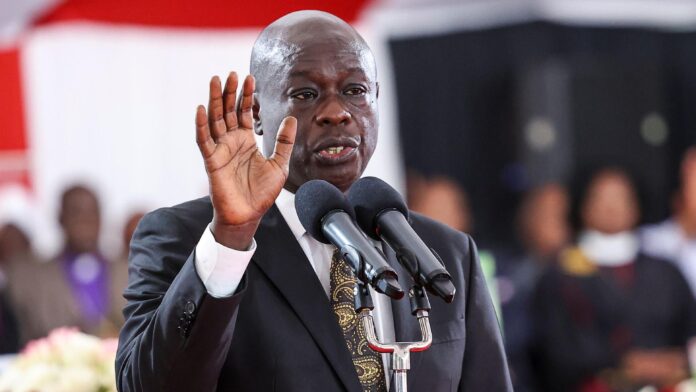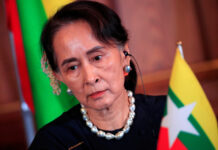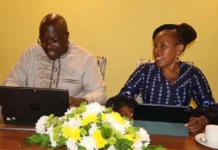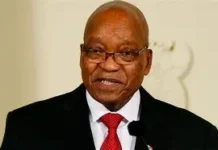By Were Kelly
NAIROBI – The trial of Moi University student David Oaga Mokaya, accused of publishing false information about President William Ruto, took a new twist on Thursday after a Nairobi court postponed the hearing to September to accommodate the student’s academic calendar.
Mokaya, a fourth-year student pursuing a Bachelor’s degree at Moi University, is facing cybercrime charges over a controversial social media post that featured an image resembling a state funeral. The image, which showed a casket draped in the Kenyan flag surrounded by military officers, bore the caption: “Ruto’s body leaves Lee Funeral Home.”Prosecutors say the post created unnecessary public alarm and amounts to spreading false information under the Computer Misuse and Cybercrimes Act.
Academic Pressure and Legal Hurdles
Appearing before Senior Principal Magistrate Benmark Ekhubi on July 31, Mokaya’s legal team, led by renowned lawyer Danstan Omari, requested that the trial be pushed to mid-September to allow Mokaya to complete his academic term.
“The proceedings are weighing heavily on the student’s mental health and academic performance,” Omari told the court. “We respectfully request the court to allow the trial to proceed after the second week of September, when the university session concludes.”
The prosecution did not oppose the postponement but sought time to consolidate additional evidence. Magistrate Ekhubi granted the adjournment and scheduled the next hearing for September 8, 2025.
Digital Forensics: Israeli Tech, Unverified Ownership
During the session, the prosecution presented testimony from Boniface Machibi, a cybercrime and digital forensics analyst attached to the Directorate of Criminal Investigations (DCI). Machibi told the court that he received two devices—a Samsung Galaxy A23 smartphone and a laptop—allegedly seized from Mokaya.
Using the Israeli-developed forensic extraction software Cellebrite (version 10.5.0), Machibi extracted over 1.2GB of data in under half an hour. He revealed that the phone had three active user profiles—boz gabi (linked to the social media handle Landlord KE), urban trend ke, and masillas. A screenshot of the disputed image was retrieved from one of the user profiles. On the laptop, investigators accessed a folder labeled DVR, which contained timestamped files matching the date the image was shared online.
However, Machibi admitted under cross-examination that he could not verify the ownership of either device or definitively link Mokaya to the online post. “I did not meet the individual in question, and I cannot say with certainty who used the device at the time the post was published,” he stated.
AI Generation? Defence Pokes Holes in Prosecution’s Case
Danstan Omari challenged the reliability of the digital evidence, arguing that the controversial image did not explicitly state that President Ruto was deceased, nor was there concrete proof Mokaya authored or disseminated the content.
“The image is ambiguous. It never expressly says the president is dead. Furthermore, we cannot rule out the possibility that it was AI-generated,” Omari told the court, adding that the prosecution had not established a direct digital footprint linking Mokaya to the post.
The defence’s argument touches on an emerging legal grey area in digital crimes—where advanced AI tools can fabricate content that’s difficult to trace or attribute to a specific individual. This opens a broader discussion on how courts should treat digital evidence in the AI age.
Public Backlash and Free Speech Debate
The case has sparked nationwide debate on free speech, digital rights, and government overreach. Following Mokaya’s arrest in March 2025, a wave of online activism under the hashtag #DropDavidMokayaCharges gained traction. Supporters argue that Mokaya was merely expressing dissent in a satirical format and should not be criminalized for it.
“Mokaya is not a criminal. He’s a young Kenyan frustrated by the system,” wrote one user on X (formerly Twitter). Others have warned that the case sets a dangerous precedent for freedom of expression, especially for young people and digital creatives.
However, the Office of the Director of Public Prosecutions (ODPP) maintains that the post was intended to incite panic and propagate misinformation, regardless of artistic or satirical intent. The ODPP also confirmed that no formal request had been filed to withdraw or review the charges.
What Lies Ahead?
With the next hearing slated for September 8, the court will revisit the forensic evidence, determine the admissibility of the data extracted, and potentially decide whether the case should proceed to full trial or be dismissed.
Legal analysts say the outcome could set a benchmark in how Kenyan courts handle digital evidence, particularly where advanced AI content and questionable attribution are involved.
As Mokaya returns to class for what could be his final semester at Moi University, his fate remains suspended between the evolving rules of cyberspace and the enduring tension between state security and individual freedom.


















